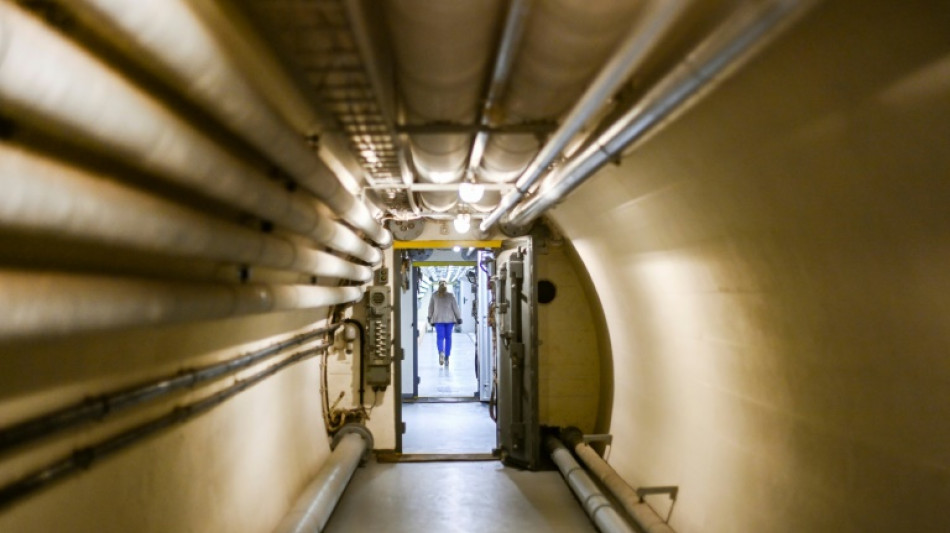
-
 Vance discusses migration during Vatican meeting with pope's right-hand man
Vance discusses migration during Vatican meeting with pope's right-hand man
-
Afghan FM tells Pakistan's top diplomat deportations are 'disappointment'

-
 British cycling icon Hoy and wife provide solace for each other's ills
British cycling icon Hoy and wife provide solace for each other's ills
-
Money, power, violence in high-stakes Philippine elections

-
 Iran, US hold second round of high-stakes nuclear talks in Rome
Iran, US hold second round of high-stakes nuclear talks in Rome
-
Japanese warships dock at Cambodia's Chinese-renovated naval base

-
 US Supreme Court pauses deportation of Venezuelans from Texas
US Supreme Court pauses deportation of Venezuelans from Texas
-
Pakistan foreign minister arrives in Kabul as Afghan deportations rise

-
 Heat and Grizzlies take final spots in the NBA playoffs
Heat and Grizzlies take final spots in the NBA playoffs
-
Iran, US to hold second round of high-stakes nuclear talks in Rome

-
 Humanoid robots stride into the future with world's first half-marathon
Humanoid robots stride into the future with world's first half-marathon
-
Migrant's expulsion puts Washington Salvadorans on edge

-
 Plan for expanded Muslim community triggers hope, fear in Texas
Plan for expanded Muslim community triggers hope, fear in Texas
-
Pakistan foreign minister due in Kabul as deportations rise

-
 White House touts Covid-19 'lab leak' theory on revamped site
White House touts Covid-19 'lab leak' theory on revamped site
-
Dodgers star Ohtani skips trip to Texas to await birth of first child

-
 US senator says El Salvador staged 'margarita' photo op
US senator says El Salvador staged 'margarita' photo op
-
Ford 'adjusts' some exports to China due to tariffs

-
 Thomas maintains two-shot lead at RBC Heritage
Thomas maintains two-shot lead at RBC Heritage
-
US to withdraw some 1,000 troops from Syria

-
 Four killed after spring storms wreak havoc in the Alps
Four killed after spring storms wreak havoc in the Alps
-
Spurs' Popovich reportedly home and well after 'medical incident'

-
 Trump goes to war with the Fed
Trump goes to war with the Fed
-
Celtics chase second straight NBA title in playoff field led by Thunder, Cavs

-
 White House site blames China for Covid-19 'lab leak'
White House site blames China for Covid-19 'lab leak'
-
Norris edges Piastri as McLaren top Jeddah practice

-
 Trump warns US could ditch Ukraine talks if no progress
Trump warns US could ditch Ukraine talks if no progress
-
Judge denies Sean 'Diddy' Combs push to delay trial

-
 80 killed in deadliest US attack on Yemen, Huthis say
80 killed in deadliest US attack on Yemen, Huthis say
-
Lebanon says two killed in Israeli strikes in south

-
 Trump says US will soon 'take a pass' if no Ukraine deal
Trump says US will soon 'take a pass' if no Ukraine deal
-
F1 success is 'like cooking' - Ferrari head chef Vasseur

-
 Cycling mulls slowing bikes to make road racing safer
Cycling mulls slowing bikes to make road racing safer
-
Macron invites foreign researchers to 'choose France'

-
 Klopp 'happy' in new job despite Real Madrid rumours: agent
Klopp 'happy' in new job despite Real Madrid rumours: agent
-
Alcaraz into Barcelona semis as defending champion Ruud exits

-
 Vance meets Italy's Meloni before Easter at the Vatican
Vance meets Italy's Meloni before Easter at the Vatican
-
Evenepoel returns with victory in Brabantse Pijl

-
 Maresca confident he will survive Chelsea slump
Maresca confident he will survive Chelsea slump
-
Mob beats to death man from persecuted Pakistan minority

-
 Lebanon says one killed in Israeli strike near Sidon
Lebanon says one killed in Israeli strike near Sidon
-
Arsenal's Havertz could return for Champions League final

-
 US officials split on Ukraine truce prospects
US officials split on Ukraine truce prospects
-
Client brain-dead after Paris cryotherapy session goes wrong

-
 Flick demands answers from La Liga for 'joke' schedule
Flick demands answers from La Liga for 'joke' schedule
-
'Maddest game' sums up Man Utd career for Maguire

-
 Trial opens for students, journalists over Istanbul protests
Trial opens for students, journalists over Istanbul protests
-
Gaza rescuers say Israeli strikes kill 24 after Hamas rejects truce proposal

-
 'Really stuck': Ukraine's EU accession drive stumbles
'Really stuck': Ukraine's EU accession drive stumbles
-
'Not the time to discuss future', says Alonso amid Real Madrid links


Inside Germany's secret Cold War cash bunker
For many years, the residents of the leafy town of Cochem in the German Rhineland went about their daily business with no idea they were living on a gold mine.
During the Cold War, the German central bank stashed away almost 15 billion marks' worth of an emergency currency in a 1,500-square-metre nuclear bunker beneath the town.
A closely guarded state secret, the currency was codenamed "BBK II" and intended for use if Germany was the target of an attack on its monetary system.
After the Cold War, the bunker passed into the hands of a regional cooperative bank and then a real estate fund. In 2016, it was bought by German couple Manfred and Petra Reuter, who turned it into a museum.
Today, with Russia's invasion of Ukraine stoking fears of nuclear conflict, interest in the bunker is growing again.
"Many people we know have pointed out that we have a safe bunker and asked whether there would be room for them in case of an emergency," said Petra Reuter.
On tours of the bunker, "questions are naturally asked about the current situation", which feels like "a leap back in time 60 years", she said. "The fears are the same."
Inside, behind a heavy iron door, long corridors lead to decontamination chambers and offices equipped with typewriters and rotary phones.
The main room consists of 12 cages where, for almost 25 years, some 18,300 boxes containing millions of 10, 20, 50 and 100 mark banknotes were stored up to the ceiling.
- Hundreds of trucks -
On the front, the banknotes were almost identical to the real deutschmarks in circulation at the time, but on the back they were very different.
Starting in 1964, the notes were delivered to the bunker by hundreds of trucks over a period of about 10 years, with no one suspecting a thing -- not even the East German Stasi secret police.
The bunker was accessed via a secret passage from what was ostensibly a training and development centre for Bundesbank employees in a residential area of the town.
Cochem, located about 100 kilometres (60 miles) from the border with Belgium and Luxembourg, was chosen because it was such a long way from the Iron Curtain.
"The citizens of the community were astonished to discover this treasure, which had been hidden for so long near their homes," said Wolfgang Lambertz, the former mayor of the town, which has around 5,000 inhabitants.
Along with the 15 billion marks stored in the bunker, just under 11 billion marks' worth of the alternative currency was also stored in the vaults of the central bank in Frankfurt.
Altogether, this added up to around 25 billion marks -- roughly equivalent to the total amount of cash circulating in the German economy in 1963.
- Operation Bernhard -
Perhaps an extreme measure to ward off a merely hypothetical attack, but the German authorities had been guided by lessons from history.
During World War II, the Nazis had launched "Operation Bernhard", in which prisoners in concentration camps were forced to manufacture counterfeit pounds with the aim of flooding England with them.
"The most plausible explanation was probably the fear that counterfeit money would be smuggled through the Iron Curtain in order to damage the West German economy," according to Bernd Kaltenhaueser, president of the Bundesbank's regional office for Rhineland-Palatinate and Saarland.
But creating a backup currency today "would no longer make sense because there is less counterfeit money in circulation and there are fewer cash payments", according to Kaltenhaueser.
In the 1980s, with the Cold War winding down and technology evolving, it was decided that the replacement currency no longer met Germany's security standards.
By 1989, the year the Berlin Wall fell, all of the notes had been taken out of the bunker, shredded and burned.
P.Anderson--BTB


